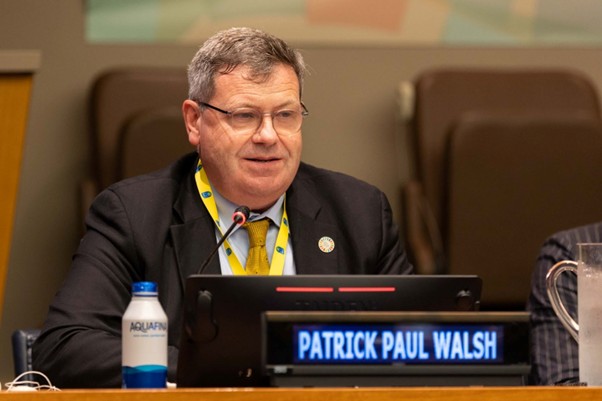This event was an official SDG8 Plenary Session of the 2025 UN High Level Political Forum
Written by Patrick Paul Walsh, Director of the SDG Academy
I was honored to have participated in the SDG 8 panel discussion at HLPF 2025, focusing on promoting sustained, inclusive, and sustainable economic growth, full and productive employment, and decent work for all. SDG 8 remains a crucial goal that requires attention to stay on track. SDG 8 is deeply interconnected with other goals, from poverty (SDG 1) and education (SDG 4) to gender equality (SDG 5) and climate action (SDG 13).
Proposed questions for the panel discussion were:
- Which areas under SDG 8 are most in need of urgent acceleration, and why?
- How can national macroeconomic frameworks be restructured to prioritize full employment and decent work?
- What mechanisms are effective in transitioning informal to formal work, particularly for women and youth?
- How can decent work goals be embedded in digital and green economy transitions?
- What are promising financing models to close the decent work and social protection gaps? • How can data systems be improved to track progress on non-standard work and labor rights?
Event Details
Organizers: UN ECOSOC
Date: 16 July 2025
Venue: UN Headquarters, NY. Recording can be found here.
Description: Introduction of the report on the 10-Year Framework of Programme on Sustainable Consumption and Production Patterns SDG 8 and interlinkages with other SDGs – Decent work and economic growth Production Patterns -What strategies and transformative measures can enhance synergies and minimize trade-offs in achieving SDG 8?
Background
With just five years left to meet the 2030 Agenda, SDG 8—promoting sustained, inclusive, and sustainable economic growth, full and productive employment, and decent work for all—remains one of the most off-track Goals.
Although modest gains have been made, including increased access to financial services, progress has stagnated or regressed across critical areas such as youth employment, informality, labour rights and child labour.
The erosion of decent work is symptomatic of broader global structural challenges, including macroeconomic volatility, inequality, climate shocks, geopolitical fragmentation and digital transformation.
Global unemployment remains historically low (5 per cent in 2024), but underemployment, informality and job precarity are widespread. Over 2 billion workers—58 per cent of the global workforce—remain in informal employment, with women and youth disproportionately represented. The situation is especially acute in least developed countries, where informal work exceeds 89 per cent.
Labour’s share of GDP continues to decline, pushing income inequality higher. Meanwhile, gender pay gaps exceed 20 per cent, and young women face NEET (Not in Employment, Education, or Training) rates that are more than double those of young men.
Social protection remains patchy and inadequate. Nearly half the global population lacks any form of coverage.
Additionally, fundamental labour rights are in decline. Violations of freedom of association, collective bargaining, and protection against discrimination and forced labour are growing concerns. Despite progress, nearly 138 million children were engaged in child labour in 2024, with around half in hazardous conditions.
Green and digital economies have immense potential to generate decent jobs, particularly for marginalized groups. However, without supportive policies including reskilling, gender-sensitive planning and regulatory safeguards, these sectors may reinforce existing inequalities. Technology and sustainability policies must be accompanied by labour market safeguards, anticipatory training and regulatory frameworks
Full employment and decent work require employment-rich structural transformation, supported by industrial policy, labor institutions and public investment. Trade and supply chains need to realign with decent work. Employment policies should support all age groups. This includes youth employment guarantees and lifelong learning systems.
Resources
The Report of the Expert Group Meeting on SDG8 is now available. Summary report – EGM on SDG8 – final.pdf
SDG Academy Courses
1. Decent Work and Economic Growth: Achieving SDG 8 Decent work and economic growth: Achieving SDG 8 – SDG Academy
2. Work and Employment for a Sustainable Future Work and Employment for a Sustainable Future – SDG Academy
3. Your Future in Green Jobs Your Future in Green Jobs – SDG Academy
4. Industrial Policy in the 21st Century The Challenge for Africa Industrial Policy in the 21st Century: The Challenge for Africa – SDG Academy
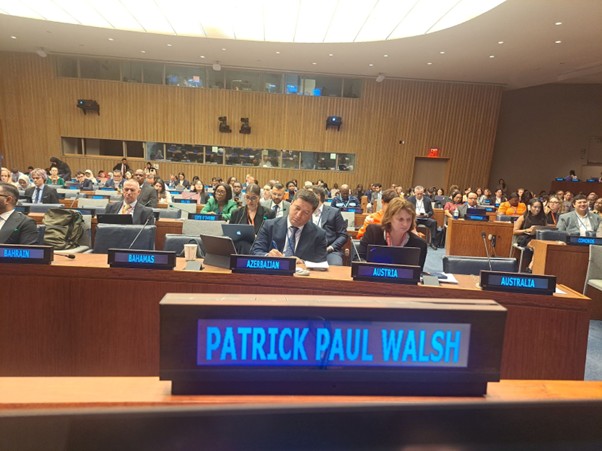
Intervention from Patrick Paul Walsh:
Statement on Education and Training for SDG 8
Global Supply Chains have evolved to be key drivers of World GDP growth. They are also associated with a race to the bottom on taxation, but also a race to the bottom on social and environmental protections. Global supply chains do tend to host three unsustainable labour market outcomes across nations to varying degrees.
- Informal employment in the workforce: By 2024, 57.8 per cent of the global workforce was informally employed, meaning they were not adequately covered by social security arrangements, legal protection or workplace safety measures. In 2024, 93.8 per cent of women in LDCs and 91.4 per cent in sub-Saharan Africa were informally employed, compared to 86.4 and 86.0 per cent of men, respectively.
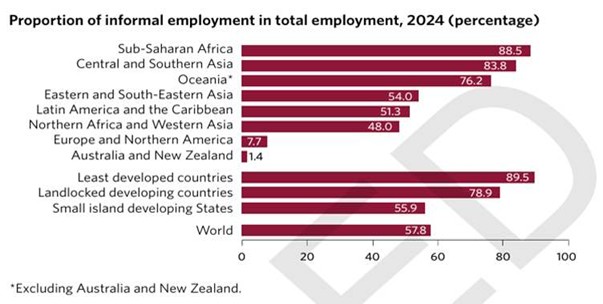
- Populations Not in Employment , Education or Training ( NEET) – particularly in Youth Populations: Youth face persistent challenges in labour markets. One in five young people (aged 15–24) globally were NEET in 2024, leaving 259 million youth without opportunities to build skills or gain work experience. Young women face the greatest barriers and are twice as likely to be NEET as young men. In Central and Southern Asia, 41.9 per cent of young women were NEET, compared to 11.5 per cent of young men.
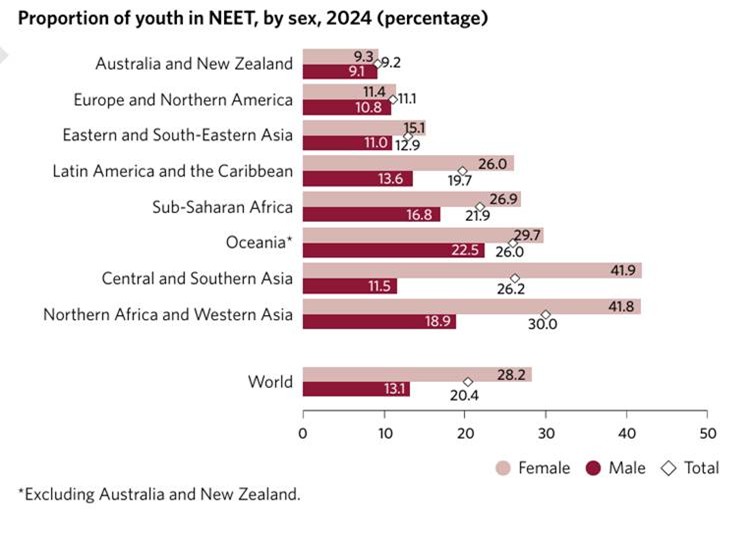
- The lack of (or effective enforcement) of fundamental labor rights: Measures the effective enforcement of fundamental labor rights, including freedom of association and the right to collective bargaining, the absence of discrimination with respect to employment, and freedom from forced labor and child labor.1
UNIDO outlines why Global Supply Chains need to be transformed into engines of economic growth that are induced by inclusive and sustainable industrial development.
Government, educational and corporate partnerships across the global supply chains can use the digital revolution to produce goods and services that are driven by investments in people who have digital and green skills. Access to such education and labour force training– especially for the young people – is the key to global supply chains from points of origin to destination.
To address this, UNIDO, UNITAR, and the SDSN, with support from DLA Piper and SustainChain, have introduced a Capabilities 4 the Future Hub.
The Hub is a collaborative platform for governments, pthe rivate sector, and educational and training institutions to navigate the green and digital transitions along supply chains.
Other SDSN Partnerships with professional training towards achieving the SDGs include
BuildSkills Academy – European Commission Project that inserts digital and green skills updates into VET curriculum and accreditation for the built environment across the EU and Global Supply Chains.
UNDP and MBRF, Future Skills Academy, have a focus on the MENA region.
UAE Government Experience Exchange Program, which began in 2018 during the World Government Summit, is a large-scale initiative that promotes a global multilateral approach to building capabilities for government administration to deliver the SDGs across the world.
Statement on the Role of the Insurance Sector to enable SDG 8
At an official side event of the 2025 ECOSOC Forum on Financing for Development & 4th PrepCom for FFD4 we launched two key SDSN projects with the insurance sector:
- The SDSN Position Paper on Insurance and Sustainable Development supported by Swiss Re
- The Massive Open Online Course on Insurance and the SDGs, in partnership with Better Insurance Network and UNITAR
In the Sevilla Platform for Action (SPA), coalitions of countries and stakeholders have put forward more than 130 high-impact initiatives. Phase II of the Insurance project is included as an SPA titled “Knowledge-exchange, capacity-building and innovation to enable F4D “ World Bank C3A project; Association of Caribbean States; United Nations Industrial Development Organization: (UNIDO); United Nations Institute for Training and Research (UNITAR); UN Sustainable Development Solutions Network (SDSN); DLA Piper; Howden
All these initiatives emphasize the insurance industry’s role in enabling the SDGs and fostering public-private collaboration. We want to embed insurance into mainstream inclusive and sustainability thinking as a driver of innovation and resilience in product and labour markets.
Insurance is a great enabler of supply chains and can help deliver Inclusive and Sustainable supply chains, but it needs workers to be in formal jobs
Formal jobs provide the structural framework for accessing insurance schemes and social protection, while these systems, in turn, incentivize formal employment by offering financial security and the ability to navigate risks of unemployment , bad health and environmental shocks (such as extreme heat).
Formal jobs also allow access to the financial system. Having a bank account and having to take out loans should not be taken for granted. Formal jobs are also good for the tax base.
There is a strong case for corporations and high-income countries to help underwrite and offer guarantees to build social protection schemes in low-income countries. Employer and worker contributions can also be part of the scheme. Formal jobs will be good for sustainable economic, social and governmental development.
- For further insights, the recorded 5th Meeting of HLPF 2025 can be viewed at: [WebTV Link]
Panel:
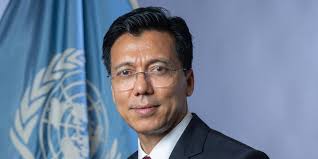
Chair: H.E. Mr. Lok Bahadur Thapa, Vice-President of ECOSOC
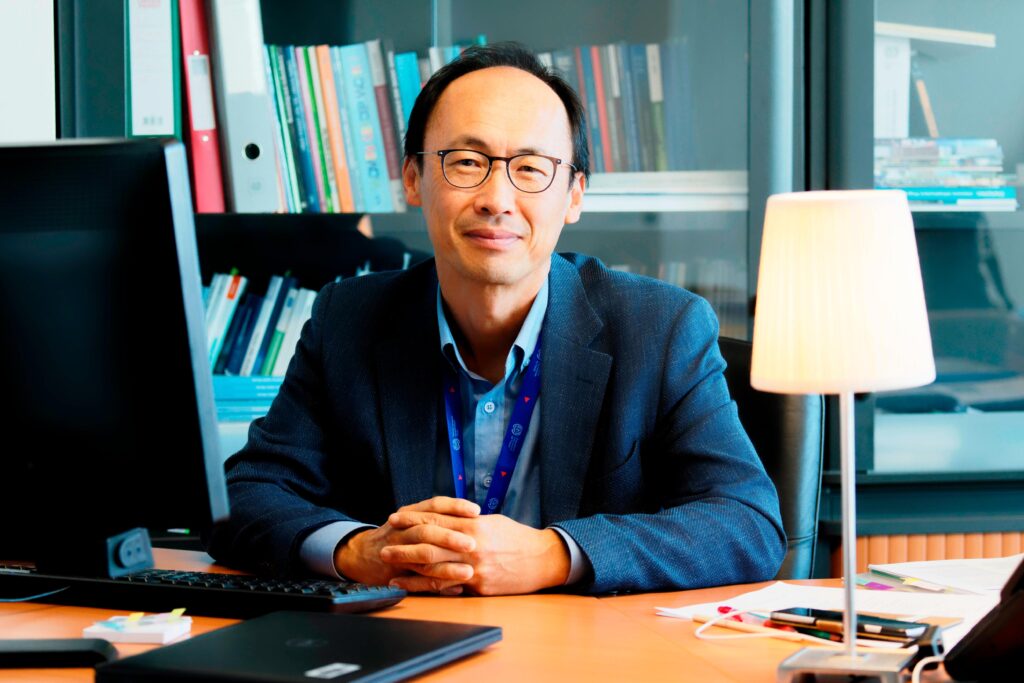
Moderator: Mr. Sangheon Lee, Director of the Employment, Job Creation and Livelihoods Department, International Labour Organisation (ILO)
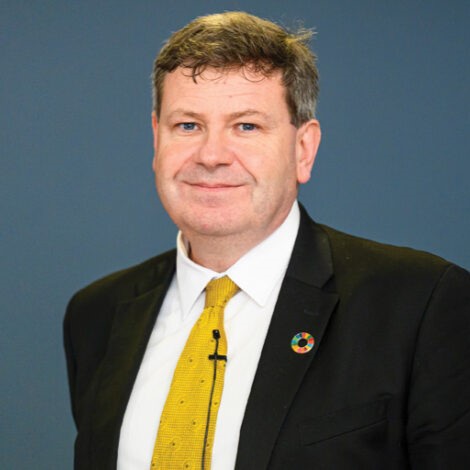
Mr. Patrick Paul Walsh, Vice President of Education and Director, SDG Academy, UN Sustainable Development Solutions Network (SDSN)

Ms. Rola Dashti, Executive Secretary, United Nations Economic and Social Commission for Western Asia (ESCWA)
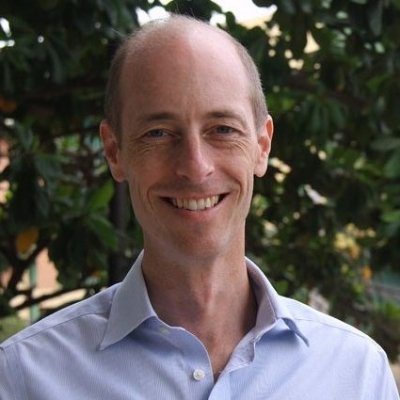
Mr. Jason Judd, Executive Director, Global Labour Institute, Cornell University ILR School

Ms. Siobhan Vipond, Vice-Chair of the ITUC Women’s Committee and Vice-President of the Canadian Labour Congress

Ms. Macarena Letelier, General Manager, Confederación de la Producción y del Comercio, Chile
- World Justice Project, Source: https://worldjusticeproject.org/our-work/wjp-rule-law-index ↩︎
